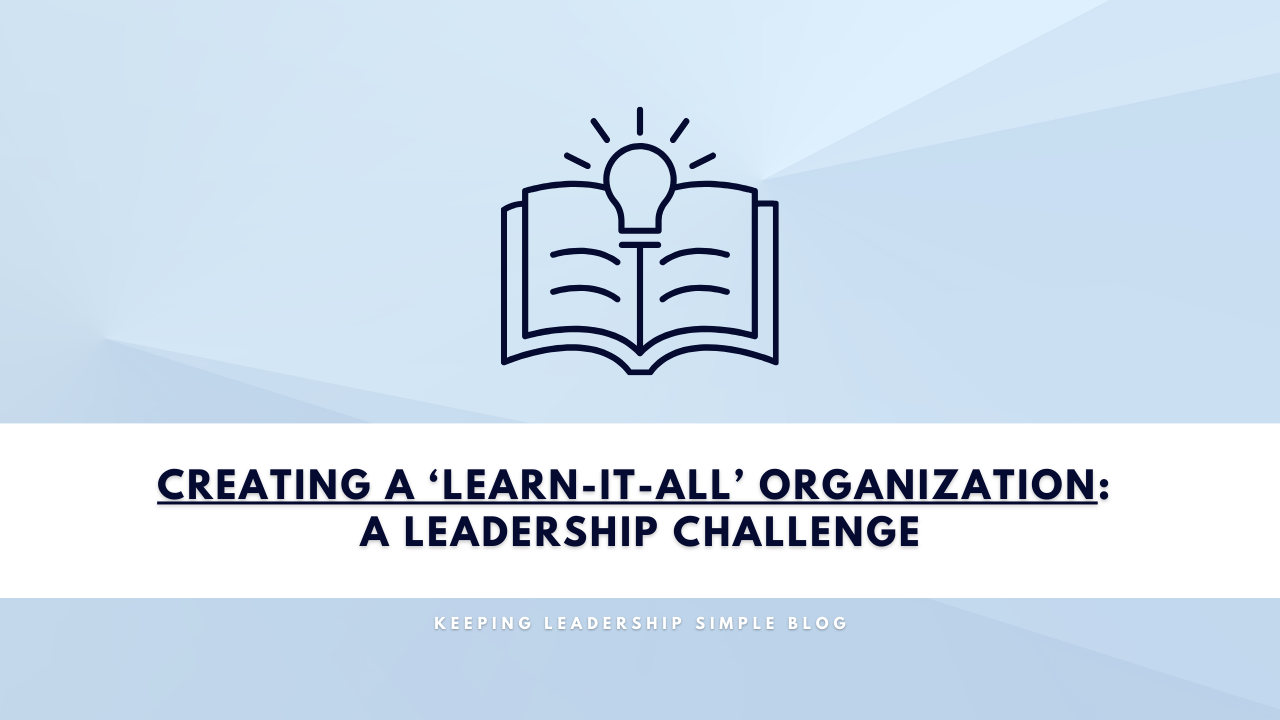Creating a 'Learn-It-All' Organization: A Leadership Challenge
Mar 12, 2025
In many organizations, a "know-it-all" mindset prevails. This is especially true in competitive environments like law enforcement, corporate sectors, and other hierarchical institutions. While individual expertise is valuable, the culture of withholding knowledge or seeing learning as a solo pursuit can be detrimental. Instead of fostering collaboration, it creates silos, stifles innovation, and weakens overall organizational effectiveness. People can use information as a weapon to keep others dependent on them.
In policing, the issue is not so much that officers believe they know everything, but that the culture is inherently competitive and domineering. This can lead to conflicts where individuals prioritize personal advancement over collective success. Officers, like many professionals in high-stakes industries, are often reluctant to share what they know, fearing it may diminish their value or advantage. This mindset isn’t unique to law enforcement—it exists in business, healthcare, education, and even within tech industries.
But in today’s fast-paced, information-driven world, particularly with the rise of artificial intelligence and digital transformation, we cannot afford to operate in silos. We must embrace a "learn-it-all" mindset, where knowledge is shared freely and individuals grow together rather than in isolation. Each roll call should be an opportunity of learning and growing, not just passing along bolos and wanted information. The future belongs to organizations that foster a culture of learning, adaptability, and collaboration. The fight for relevant information is relentless and those who hoard knowledge will be left behind.
LEADERSHIP CHALLENGE:
Focus on creating a "learn-it-all" culture within your organization. Encourage people to grow TOGETHER instead of just individually.
Shifting from a "know-it-all" mentality to a "learn-it-all" mindset can have a transformative impact on any organization. When employees at all levels embrace learning over competing, it fosters a sense of teamwork where knowledge sharing becomes the norm. By prioritizing growth and open communication, an organization can improve its collective response to challenges, as everyone is empowered to contribute their own expertise. This transition encourages the understanding that sharing knowledge does not diminish one's value but enhances the organization as a whole.
Tips for Building a 'Learn-It-All' Culture:
Lead by Example – If you want a culture of continuous learning, leadership must model it. Be open to feedback, seek out new knowledge, and show that learning never stops, regardless of rank or position.
Encourage Knowledge Sharing – Create an environment where people feel comfortable sharing their expertise and experiences. This can be through mentoring programs, debriefs, or open discussions after major projects or incidents.
Shift the Mindset from Competition to Collaboration – Instead of fostering an environment where people feel they must guard their expertise to get ahead, reward teamwork and knowledge sharing.
Provide Learning Opportunities – Offer training programs, workshops, and cross-functional experiences that encourage employees to expand their skill sets and perspectives.
Recognize and Reward Continuous Learning – Acknowledge those who actively seek to grow and share their knowledge. Recognition can be as simple as public praise or as formal as a career development pathway.
Create Safe Spaces for Innovation – Encourage employees to experiment with new ideas and solutions without fear of failure. When people feel safe to try, they’re more likely to contribute innovative solutions.
Emphasize that Learning is a Team Effort – Make it clear that collective intelligence is more powerful than individual intelligence. The organization thrives when knowledge is a shared asset, not a personal currency.
Leverage AI and Digital Tools for Knowledge Sharing – In the age of artificial intelligence, access to information is more critical than ever. Utilize AI-driven platforms, digital communication tools, and data-sharing systems to ensure that everyone has access to the latest insights and best practices.
Make all meetings a growing opportunity, including roll calls.
By embracing a "learn-it-all" culture, organizations can enhance teamwork, strengthen leadership, and ultimately adapt to the ever-evolving demands of the modern world. Those who share knowledge will lead the future, while those who hoard it will be left behind.
So, this week, challenge yourself to break away from the 'know-it-all' mindset and inspire your team to grow together. The future belongs to those who learn.
- Dean Crisp
Stay connected with news and updates!
Join our email list to receive the latest news and updates from the LHLN team!
We will never sell your information, for any reason.
